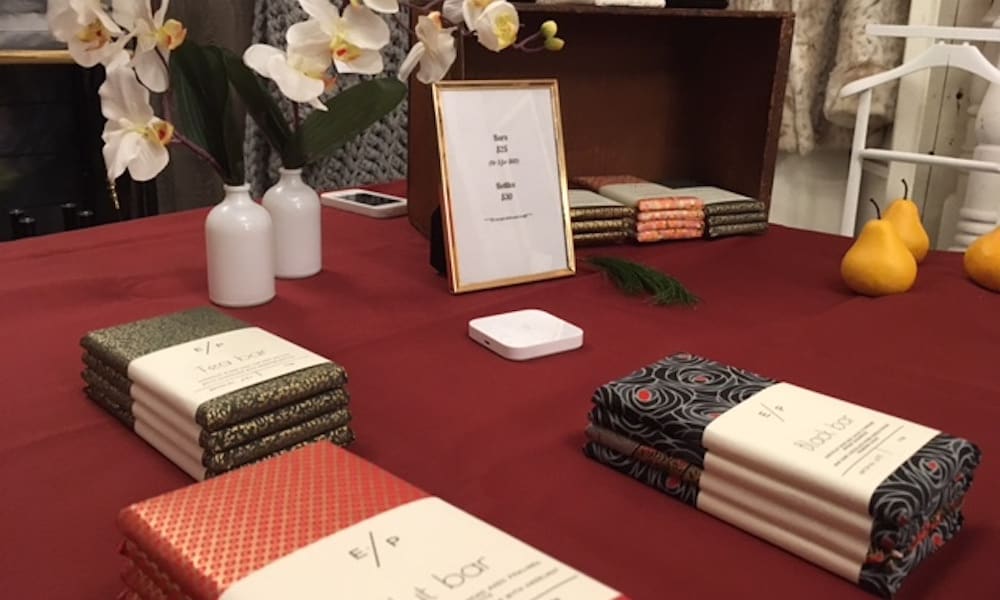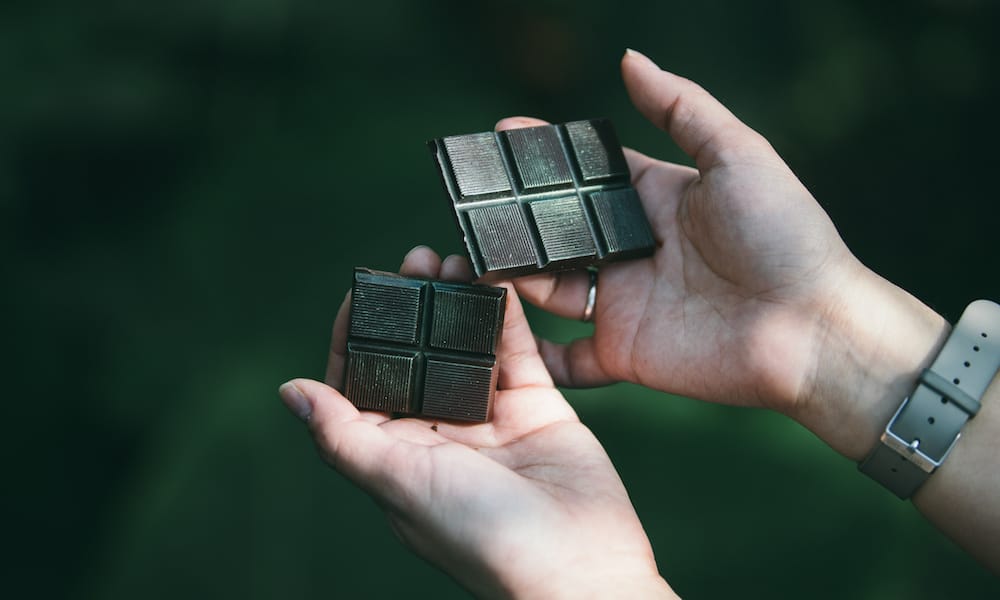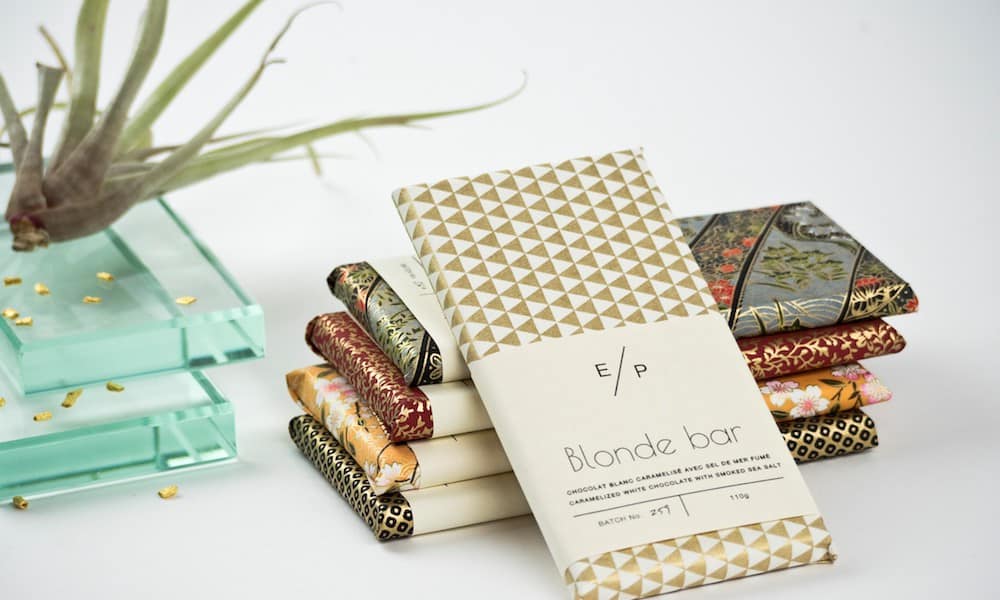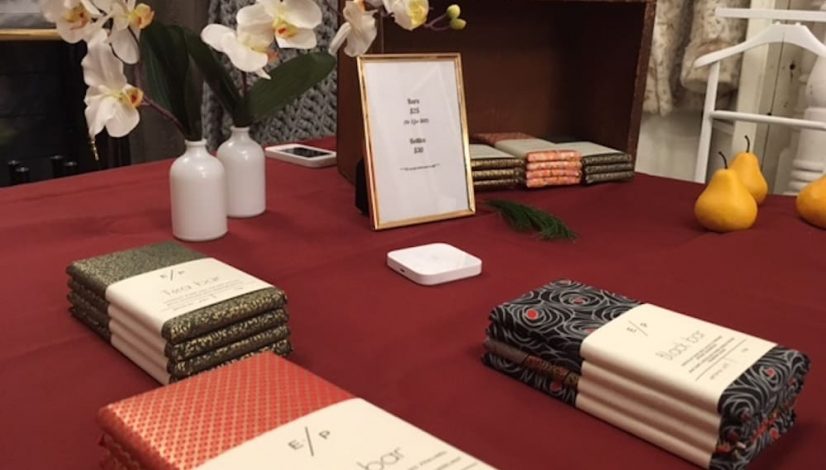Navigating Canada’s Underground Edibles Scene With EP Infusions
The edibles scene in Canada is blowing up, despite being excluded from the first round of legalization. Edibles will be legal in Canada by Fall 2019, but until then, Canadians are flocking to the grey market or making their own infused creations to get their fix. Legal retail shops will be restricted to only selling cannabis flower and diluted oil. But that’s not stopping underground canna-brands from preparing for legalization as micro-processing licenses roll out. EP Infusions, Montreal’s number one infused chocolatier, is making waves across the country, as their mouthwatering edible creations have won the hearts, minds, and taste buds of Canadians.

Courtesy of EP Infusions
Featured in Elle Magazine, Vice, and The Globe And Mail, EP has gone on to make history as the featured edible in the 80th edition of the industry’s Food & Beverage Magazine. EP’s high-design aesthetic means every gourmet bar is exquisitely wrapped in Japanese paper. Not only are these edibles a favorite with Canadian foodies, they also make for elegant gifts—you could even give one to your grandmother!
We sat down with Riley Starr, creator of the legendary underground Canadian edibles brand EP Infusions, to find out how they are preparing for legalization.
High Times: What inspired you to create EP Infusions?
Riley Starr: I remember very clearly the first time I brewed a batch of beer. The results weren’t exactly top-shelf, but I threw a house party and served it to all my friends. That experience changed me – being in a room full of the people I cared about most, laughing and talking and playing music, drunk on something I had created, was profound. I felt like I had found my calling.
That eventually led me to brewing professionally for several years. But I’ve had a love for cannabis my entire adult life, and always wanted to see weed elevated to the same level of respect and appreciation that craft beer enjoys these days. I started experimenting with cannabis extractions on my own time – having access and familiarity with brewery valves, pipes and fittings, I started building my own closed-loop systems and making tinctures out of the different strains I liked to smoke.
Like a lot of people, the first time I tried an edible I was high for two days. And, like a lot of people, I just assumed that’s what the edible experience was. But experimenting with oils and tinctures I realized that oral cannabis could provide a whole spectrum of experiences, and it became my favorite way to get high. I wanted a way to share that with other people, and EP Infusions was born.

Courtesy of EP Infusions
HT: EP Infusions is the most gourmet edible on the scene. What were you doing before EP?
RS: My career before EP was in brewing. Before that I worked in construction for a few years, and growing up worked as a mechanic in a couple of bike shops in Montreal. My hobbies, though, almost always revolved around food. I’ve dry-cured sausage, butchered a pig with a group of friends and turned the whole carcass into head cheese, pancetta, chicharones, ham. I’ve grown my own edible mushrooms and baked my own bread (although my partner has always been able to make the better loaf). Food has always been, for me, the perfect lens through which all the best and most interesting parts of human existence pass: culture, biology, aesthetics, and pleasure. It’s how we nurture, love, and express gratitude. Food is its own universe: already so vast that you could study it for a lifetime and barely scratch the surface, and still expanding endlessly in every direction.
HT: Given your experience as a brewer, what is your experience with cannabis beverages? Do they have a future internationally?
RS: We’ve had a few years to watch the cannabis market in the US find its footing, and while beverages have captured a segment of the market, they remain a niche product. I think there is vast untapped potential there. I was driven to start working on infused drinks because drinking is so deeply woven into our social rituals already. We’re still living with a lot of negative cultural baggage surrounding cannabis, and I want to see it take its place in mainstream culture sooner rather than later. By presenting it beverage form, it can easily slip into the same roles as alcohol and feel familiar and approachable for people who are still burdened with those negative stereotypes.
I’ve had the privilege of being served some incredible infused meals in the past, but I do wonder if that will turn out to be a fad. With alcohol I think we understand that food and drink are separate components of a meal that complement and support each other – we don’t try to meld them into a single experience, except perhaps as an element of flavour. I think infused beverages also offer that perfect balance. Cannabis and food are deeply connected, but work best as two distinct elements in harmony, and infused beverages are the perfect vehicle for that.
HT: What does EP stand for?
RS: In our earliest days, when legalization was still just a political promise and far, far from reality, I felt a lot of uncertainty and doubt, but there was also a feeling that the future was wide open and full of potential. “Everything is possible” became a sort of mantra, and ended up defining the brand in many ways. Tout est possible!
HT: What are you doing to celebrate legalization?
RS: We’re hosting a private event for our local Montreal fans. Every single one of them has written at least a sentence or two of the EP story, and it feels really important that we show our gratitude and share a place and a moment together as the world changes.

Courtesy of EP Infusions
HT: How is EP preparing for the legal market in 2019?
RS: Canada after October 17 will be a very different place for those of us in the cannabis bubble. We’ve been incredibly fortunate to have the chance to make our mark on the underground scene, but our goal has always been to find a place in the legal market. We’re closing the kitchens for now, and have been pursuing discussions with licensed entities and we’re very optimistic that we’ll be able to close a deal that will bring us to that final step.
Weed is such a big part of the culture in Montreal and in Quebec in general. It’s sad to see how underrepresented we are in the emerging market, whether in the form of underground brands or licensed producers. EP has deep roots here, and there are companies out there who see the value in our brand and in our connection to this place. Moving towards licenced production will be the end of EP in a certain way – but we know it will be the beginning of something far greater.
HT: How is legalization in Quebec different from the rest of Canada?
RS: Quebec unfortunately is taking a very strict approach to cannabis regulation. We’re one of only two provinces that are trying to forbid home cultivation, and retail is restricted to provincial stores only. The entire industry on the distribution/retail side will be government-controlled.
It’s a shame, because the political establishment here likes to think of itself as progressive and left-of-center, but they don’t seem very interested in respecting the rights of cannabis consumers or fostering a competitive industry.
HT: What do you see as the future of infused edibles and beverages in Canada?
RS: In Canada we already benefit from an incredibly vibrant and diverse food and drink culture – we’re lucky to have people from every part of the world sharing and contributing to that culture. We have so much to build on with the infused product market, I’m sure we’ll be doing things in five years that we can’t imagine right now. And everything we do here will set the stage for cannabis culture around the world, as (hopefully) prohibition continues to recede into the dustbin of history.
The post Navigating Canada’s Underground Edibles Scene With EP Infusions appeared first on High Times.


